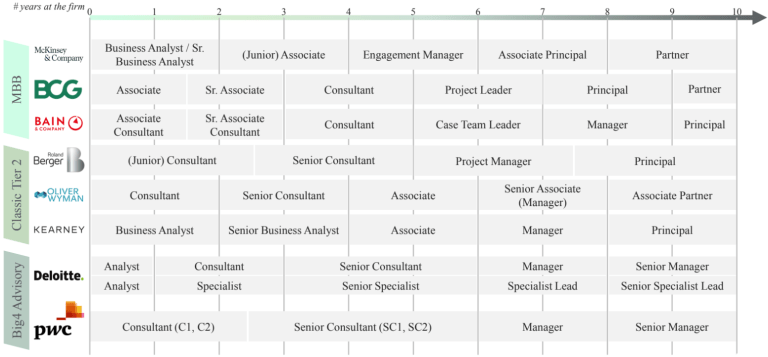“Sometimes I get asked why I chose consulting and whether I would recommend it to recent graduates. While there is no perfect answer to this question as everyone is different with diverging needs, having worked in consulting for over years now, I can give you a brief summary on what I think the greatest benefits and drawbacks of this career path are.” – Senior Consultant, OC&C
Self development and growth opportunities
One of the most crucial elements of consulting is that you will encounter so many different projects with almost unpredictable outcomes and different challenges, where you will rapidly gain crucial skills that might be manifested later in your career. You have to know, consulting is NOT a 9-5 job, the hours are long and you will be under constant stress, but at the same time, you will gain invaluable knowledge in a immensely short period of time. Typically, a consulting project will last for a couple of months, thus, after a few years of working, you will have encountered 10-12 different projects, clients, industries, problems and solutions. Your business instincts and awareness will be enhanced to their ultimate, which will make you an extremely valuable resource on the labor market. Moreover, networking is a huge part of consultancy; you will work with colleagues at all levels and clients at a variety of organisations–make the most of it. Your connections can make a huge difference to your career progression.
All in all, you will gain many soft and hard skill sets as well as a solid network, which are all going to help you in your future career. As such, this is a very valuable attribute of consulting.
Given responsibility
Again, this might be a dividing point when looking out for career paths. In consulting, you will be entrusted with responsibility and working with senior clients very early into your career, which is exciting if you are the type that thrives on challenges. I personally hated when in my earlier jobs I was responsible for matters that did not have any weight or tangible outcome. I felt useless and easily replaceable. Consulting changed this. I was entrusted early on to hold meetings with the CFO of a FTSE 100 firm, which was shocking to me, but it was for the better. This huge responsibility acted as a fuel to my ambition and I greatly thrived on it, making it one of my best projects that I have worked on to date.
However, I must acknowledge that this is not for everyone. If you are more easy going and do not like mounting responsibility on your shoulders, then I would suggest avoiding consulting. Conversely, for people who thrive on it, who want to see the business outcome of their decisions, I would highly suggest giving consulting a shot, as you will surely enjoy it.
Intellectually stimulating environment
Another shocking point for me when I joined the industry was that all of my colleagues were genuinely motivated and extremely smart. What is more, they were always extremely friendly and collaborative with me! The office organized many meetings with the whole team, which was a great way to understand where my work fitted into the larger context.
The consulting sector attracts top-quality graduates, so you will be working with diverse, intelligent, like-minded colleagues who enjoy combining creative, innovative thinking with a very practical approach to problem solving.
Compensation package
I would lie if I said that compensation was not among the most influential factors in my decision to choose consulting. It should not ever be your sole reason for choosing a career path, but the consulting sector is renowned for its high salaries and comprehensive benefits packages. In the US, after a recent change in compensation, fresh graduates start at a six-figure base salary at MBB (McKinsey, BCG and Bain), with the total compensation reaching up to 130k, which is absolutely mind-blowing. In Europe, with the numbers being a bit more modest, consultants still receive an extremely high salary. Other than cold cash, consultants also receive a lot of benefits that make the total compensation very attractive. Frankly speaking, if you join the industry, you will have a decent compensation, but you will also have to work for it. Hours tend to average 50-70 hours a week (depending on which firm you join).

Summary
All in all, consultants need to learn a lot and fast. It is essential for their career success and survival. They learn a lot about many different types of industries and business challenges through a variety of engagements. These lessons enhance their overall business judgment. Employees in consulting often get the opportunity to tackle areas of responsibility that are much greater than those normally afforded to people with a similar number of years experience. As a result, they get to think about and work on issues that their peers may not get to see for years. Consultants also learn a lot because consulting firms employ an apprenticeship model. They often work alongside some of the smartest people in business. In the process, they pick up lots of tips, tricks, and thought processes from some of the best business thinkers available. In short, consulting helps create a well-rounded profile & prepares you for long-term career success.
On a different note, while consulting is a very attractive career path, with lots of opportunities for personal growth, it is definitely not for everyone. I would like to also highlight that the industry is very demanding and will probably take a toll on you. If you believe that you are a high achiever and can work under constant stress, you should definitely join the industry, as the benefits will far outweigh the cons.
This article is part of a series of introductory articles:





